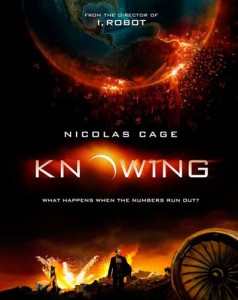 A bizarre airplane crash, mysterious whispers, a foreboding set of numbers, a strange group of outsiders who seem to know what’s going on, and a shiny black stone which hints at clues to a resolution. While these themes could apply to Lost, all of them are also featured in Knowing—the recent sci-fi movie with Nicholas Cage that comes out on DVD on Tuesday, July 7th.
A bizarre airplane crash, mysterious whispers, a foreboding set of numbers, a strange group of outsiders who seem to know what’s going on, and a shiny black stone which hints at clues to a resolution. While these themes could apply to Lost, all of them are also featured in Knowing—the recent sci-fi movie with Nicholas Cage that comes out on DVD on Tuesday, July 7th.
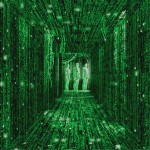 When I first saw The Matrix back in 1999, I instantly became fascinated with its “virtual reality world” concept. At the time, and for many years afterwards, I saw the theme as a metaphor for the illusionary material world we live in—a world of time, space, and the assumption that we are all separate individuals. My belief, in line with what I had taken from kabbalah, was that in reality, we were all one united energy force. Call it God, the light, Buddha, Allah, the universe, sentient energy, whatever. The point was that this energy created our illusionary world in order to experience itself. After all, since it was an all-knowing, all-powerful energy, existence was pretty boring. This energy wanted to experience the one thing it couldn’t know: what it was like to not be it. So, it created an imaginary world of time and space and separated itself there into different material elements that eventually evolved into human beings.
When I first saw The Matrix back in 1999, I instantly became fascinated with its “virtual reality world” concept. At the time, and for many years afterwards, I saw the theme as a metaphor for the illusionary material world we live in—a world of time, space, and the assumption that we are all separate individuals. My belief, in line with what I had taken from kabbalah, was that in reality, we were all one united energy force. Call it God, the light, Buddha, Allah, the universe, sentient energy, whatever. The point was that this energy created our illusionary world in order to experience itself. After all, since it was an all-knowing, all-powerful energy, existence was pretty boring. This energy wanted to experience the one thing it couldn’t know: what it was like to not be it. So, it created an imaginary world of time and space and separated itself there into different material elements that eventually evolved into human beings.
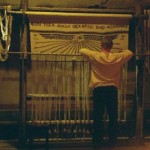 Just as how the Others blindly follow Jacob, we Lost fans have invested five years of our lives blindly following a TV show that has become increasingly intricate. Will our commitment be worth it in the end? Those of us who have faith have stuck with it, but we’ve lost a lot of former believers along the way. What if the series finale is a disappointment and leaves many of the major questions unanswered? Will we question our blind faith in a show that we hoped would give us answers to its convoluted storyline, and beyond? Hopefully we won’t get to that point, but I have some thoughts just in case we do.
Just as how the Others blindly follow Jacob, we Lost fans have invested five years of our lives blindly following a TV show that has become increasingly intricate. Will our commitment be worth it in the end? Those of us who have faith have stuck with it, but we’ve lost a lot of former believers along the way. What if the series finale is a disappointment and leaves many of the major questions unanswered? Will we question our blind faith in a show that we hoped would give us answers to its convoluted storyline, and beyond? Hopefully we won’t get to that point, but I have some thoughts just in case we do.
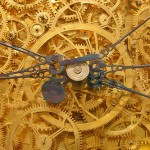 At the end of my last column, I asked whether the “variable” would prove to be an event that could change everything. The one thing that could have a domino effect on the outcomes of every event that followed. I wondered if this changeable event is what Ben and Widmore have been fighting for control of. After watching “The Variable,” I have to say “yes,” this is what the term is referring to. However, I’m still not so sure whether the variable will actually vary anything according to the mythology of the show.
At the end of my last column, I asked whether the “variable” would prove to be an event that could change everything. The one thing that could have a domino effect on the outcomes of every event that followed. I wondered if this changeable event is what Ben and Widmore have been fighting for control of. After watching “The Variable,” I have to say “yes,” this is what the term is referring to. However, I’m still not so sure whether the variable will actually vary anything according to the mythology of the show.
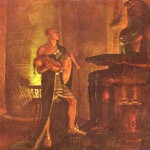 Perhaps the most ironic theme of “Dead Is Dead” is that it actually seems to imply anything but. The episode is more about the futility of death, rather than its finality, yet, I don’t think this is its ultimate message. The message in its fullest form is that dead is only dead if your services will no longer be needed.
Perhaps the most ironic theme of “Dead Is Dead” is that it actually seems to imply anything but. The episode is more about the futility of death, rather than its finality, yet, I don’t think this is its ultimate message. The message in its fullest form is that dead is only dead if your services will no longer be needed.
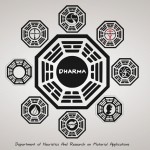 Before I go to sleep at night, sometimes I ask the universe a question about my destiny. The answer, as bizarre as it may seem, usually comes in the form of a song that wakes me up on my clock radio the next morning. While I haven’t done this in awhile, last night I once again had the urge. I asked the universe (God, the light, soul guides, my future self, whatever you wanna call it) what is going to happen on December 22, 2012—the day after the Mayan calendar abruptly ends. The answer I received really surprised me.
Before I go to sleep at night, sometimes I ask the universe a question about my destiny. The answer, as bizarre as it may seem, usually comes in the form of a song that wakes me up on my clock radio the next morning. While I haven’t done this in awhile, last night I once again had the urge. I asked the universe (God, the light, soul guides, my future self, whatever you wanna call it) what is going to happen on December 22, 2012—the day after the Mayan calendar abruptly ends. The answer I received really surprised me.
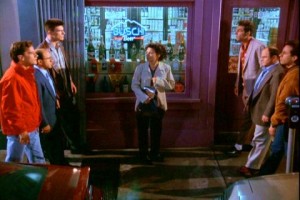 The concept behind Lost’s “He’s Our You” is that different people or things in our lives often take on very similar roles. In other words, multiple actors often play the same character in the movie that is your life experience. This intriguing concept actually reminds me of an episode of Seinfeld I first saw years ago. In “The Bizarro Jerry,” Elaine breaks up with a boyfriend but they decide to remain friends—similar to her relationship with Jerry whom she’d also dated prior to becoming friends. Comically, it turns out that this “Bizarro Jerry” has…
The concept behind Lost’s “He’s Our You” is that different people or things in our lives often take on very similar roles. In other words, multiple actors often play the same character in the movie that is your life experience. This intriguing concept actually reminds me of an episode of Seinfeld I first saw years ago. In “The Bizarro Jerry,” Elaine breaks up with a boyfriend but they decide to remain friends—similar to her relationship with Jerry whom she’d also dated prior to becoming friends. Comically, it turns out that this “Bizarro Jerry” has…
 As you’ve probably noticed, the title of a Lost episode often hints at more than just the episode’s story on a surface level. Many times, it provides a clue to its mythological messages as well. This was true of “316,” of “LaFleur,”* and now of “Namaste.” While Buddhist/Hindu principles pop up in Lost every so often, I was hoping that they might be a major theme of this episode due to its title, and I was not disappointed.
As you’ve probably noticed, the title of a Lost episode often hints at more than just the episode’s story on a surface level. Many times, it provides a clue to its mythological messages as well. This was true of “316,” of “LaFleur,”* and now of “Namaste.” While Buddhist/Hindu principles pop up in Lost every so often, I was hoping that they might be a major theme of this episode due to its title, and I was not disappointed.
 What is definitely no joke is what happens to the world in the Layman book during this timeframe. While I began writing the trilogy in 2002 and finished the first draft (of all three) in mid-2005, there is a lot in the story that is eerily prophetic of today’s situation: a collapse of the world economy, the emergence of the green revolution with a focus on reusable energy sources to replace oil, world floods, food epidemics and shortages and more. There are also a bunch of things in the books that are too fantastical to even speculate on. To be honest, when I originally wrote them, they were meant as more mythological metaphors, not really to be taken literally. Now, I’m not so sure. (Actually, around the time of Hurricane Katrina and the Indian Ocean Tsunami is when I became unsure.) Whatever happens though, whether it be tomorrow, in 2012, or if ever, I feel like the messages I received today are letting me know that it’s going to be all right. And I just thought I’d share that with all of you.
What is definitely no joke is what happens to the world in the Layman book during this timeframe. While I began writing the trilogy in 2002 and finished the first draft (of all three) in mid-2005, there is a lot in the story that is eerily prophetic of today’s situation: a collapse of the world economy, the emergence of the green revolution with a focus on reusable energy sources to replace oil, world floods, food epidemics and shortages and more. There are also a bunch of things in the books that are too fantastical to even speculate on. To be honest, when I originally wrote them, they were meant as more mythological metaphors, not really to be taken literally. Now, I’m not so sure. (Actually, around the time of Hurricane Katrina and the Indian Ocean Tsunami is when I became unsure.) Whatever happens though, whether it be tomorrow, in 2012, or if ever, I feel like the messages I received today are letting me know that it’s going to be all right. And I just thought I’d share that with all of you.
Something’s coming. Something big. I think whatever it is, if we…
 The concept of taking a leap of faith has been covered many times on Lost. Locke had told Jack that he was taking a leap of faith by pressing the button; Hurley took a leap of faith by risking his life with Charlie to get the DHARMA van started as it sped down a hill; and in the episode titled, “316,” the theme shows up throughout. In fact, the title itself should’ve been the first tip-off.
The concept of taking a leap of faith has been covered many times on Lost. Locke had told Jack that he was taking a leap of faith by pressing the button; Hurley took a leap of faith by risking his life with Charlie to get the DHARMA van started as it sped down a hill; and in the episode titled, “316,” the theme shows up throughout. In fact, the title itself should’ve been the first tip-off.
 A bizarre airplane crash, mysterious whispers, a foreboding set of numbers, a strange group of outsiders who seem to know what’s going on, and a shiny black stone which hints at clues to a resolution. While these themes could apply to Lost, all of them are also featured in Knowing—the recent sci-fi movie with Nicholas Cage that comes out on DVD on Tuesday, July 7th.
A bizarre airplane crash, mysterious whispers, a foreboding set of numbers, a strange group of outsiders who seem to know what’s going on, and a shiny black stone which hints at clues to a resolution. While these themes could apply to Lost, all of them are also featured in Knowing—the recent sci-fi movie with Nicholas Cage that comes out on DVD on Tuesday, July 7th.
 Just as how the Others blindly follow Jacob, we Lost fans have invested five years of our lives blindly following a TV show that has become increasingly intricate. Will our commitment be worth it in the end? Those of us who have faith have stuck with it, but we’ve lost a lot of former believers along the way. What if the series finale is a disappointment and leaves many of the major questions unanswered? Will we question our blind faith in a show that we hoped would give us answers to its convoluted storyline, and beyond? Hopefully we won’t get to that point, but I have some thoughts just in case we do.
Just as how the Others blindly follow Jacob, we Lost fans have invested five years of our lives blindly following a TV show that has become increasingly intricate. Will our commitment be worth it in the end? Those of us who have faith have stuck with it, but we’ve lost a lot of former believers along the way. What if the series finale is a disappointment and leaves many of the major questions unanswered? Will we question our blind faith in a show that we hoped would give us answers to its convoluted storyline, and beyond? Hopefully we won’t get to that point, but I have some thoughts just in case we do. At the end of my last column, I asked whether the “variable” would prove to be an event that could change everything. The one thing that could have a domino effect on the outcomes of every event that followed. I wondered if this changeable event is what Ben and Widmore have been fighting for control of. After watching “The Variable,” I have to say “yes,” this is what the term is referring to. However, I’m still not so sure whether the variable will actually vary anything according to the mythology of the show.
At the end of my last column, I asked whether the “variable” would prove to be an event that could change everything. The one thing that could have a domino effect on the outcomes of every event that followed. I wondered if this changeable event is what Ben and Widmore have been fighting for control of. After watching “The Variable,” I have to say “yes,” this is what the term is referring to. However, I’m still not so sure whether the variable will actually vary anything according to the mythology of the show. Perhaps the most ironic theme of “Dead Is Dead” is that it actually seems to imply anything but. The episode is more about the futility of death, rather than its finality, yet, I don’t think this is its ultimate message. The message in its fullest form is that dead is only dead if your services will no longer be needed.
Perhaps the most ironic theme of “Dead Is Dead” is that it actually seems to imply anything but. The episode is more about the futility of death, rather than its finality, yet, I don’t think this is its ultimate message. The message in its fullest form is that dead is only dead if your services will no longer be needed. Before I go to sleep at night, sometimes I ask the universe a question about my destiny. The answer, as bizarre as it may seem, usually comes in the form of a song that wakes me up on my clock radio the next morning. While I haven’t done this in awhile, last night I once again had the urge. I asked the universe (God, the light, soul guides, my future self, whatever you wanna call it) what is going to happen on December 22, 2012—the day after the Mayan calendar abruptly ends. The answer I received really surprised me.
Before I go to sleep at night, sometimes I ask the universe a question about my destiny. The answer, as bizarre as it may seem, usually comes in the form of a song that wakes me up on my clock radio the next morning. While I haven’t done this in awhile, last night I once again had the urge. I asked the universe (God, the light, soul guides, my future self, whatever you wanna call it) what is going to happen on December 22, 2012—the day after the Mayan calendar abruptly ends. The answer I received really surprised me. The concept behind Lost’s “He’s Our You” is that different people or things in our lives often take on very similar roles. In other words, multiple actors often play the same character in the movie that is your life experience. This intriguing concept actually reminds me of an episode of Seinfeld I first saw years ago. In “The Bizarro Jerry,” Elaine breaks up with a boyfriend but they decide to remain friends—similar to her relationship with Jerry whom she’d also dated prior to becoming friends. Comically, it turns out that this “Bizarro Jerry” has…
The concept behind Lost’s “He’s Our You” is that different people or things in our lives often take on very similar roles. In other words, multiple actors often play the same character in the movie that is your life experience. This intriguing concept actually reminds me of an episode of Seinfeld I first saw years ago. In “The Bizarro Jerry,” Elaine breaks up with a boyfriend but they decide to remain friends—similar to her relationship with Jerry whom she’d also dated prior to becoming friends. Comically, it turns out that this “Bizarro Jerry” has… As you’ve probably noticed, the title of a Lost episode often hints at more than just the episode’s story on a surface level. Many times, it provides a clue to its mythological messages as well. This was true of “316,” of “LaFleur,”* and now of “Namaste.” While Buddhist/Hindu principles pop up in Lost every so often, I was hoping that they might be a major theme of this episode due to its title, and I was not disappointed.
As you’ve probably noticed, the title of a Lost episode often hints at more than just the episode’s story on a surface level. Many times, it provides a clue to its mythological messages as well. This was true of “316,” of “LaFleur,”* and now of “Namaste.” While Buddhist/Hindu principles pop up in Lost every so often, I was hoping that they might be a major theme of this episode due to its title, and I was not disappointed.
 The concept of taking a leap of faith has been covered many times on Lost. Locke had told Jack that he was taking a leap of faith by pressing the button; Hurley took a leap of faith by risking his life with Charlie to get the DHARMA van started as it sped down a hill; and in the episode titled, “316,” the theme shows up throughout. In fact, the title itself should’ve been the first tip-off.
The concept of taking a leap of faith has been covered many times on Lost. Locke had told Jack that he was taking a leap of faith by pressing the button; Hurley took a leap of faith by risking his life with Charlie to get the DHARMA van started as it sped down a hill; and in the episode titled, “316,” the theme shows up throughout. In fact, the title itself should’ve been the first tip-off.
